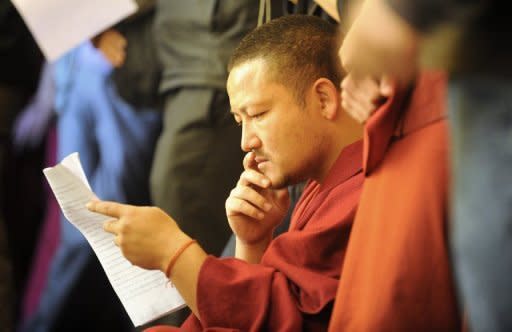Tibet exiles blame China 'hardliners' for immolations
Tibet's government-in-exile on Saturday blamed China's "hardline" leaders for a string of Tibetan self-immolations as it marked the anniversary of the Dalai Lama's failed revolt against Chinese rule. In the past year, more than 20 Tibetans, most of them monks, have set themselves ablaze to protest Beijing's rule, sparking international condemnation of what critics call religious and cultural repression. Lobsang Sangay, the head of the exiled government, said that while he strongly discouraged such extreme actions, the "fault lies squarely with the hardline leaders in Beijing". Beijing has heaped blame for the self-immolations on the Dalai Lama, who lives in exile in India, accusing the 76-year-old Buddhist leader and his followers of plotting to create "turmoil" in China's Tibetan-inhabited areas. But Sangay said "the self-immolations are an emphatic rejection of the empty promises of the so-called âsocialist paradise'" and the lack of ability to protest in any other way in Tibet. "Today, there is no space for any conventional protests such as hunger strikes, demonstrations and even peaceful gatherings in Tibet," Sangay said. "Tibetans are therefore taking extreme actions such as the one by 26 Tibetans who have committed self-immolations since 2009," Sangay said. The Harvard academic's statement comes as Tibetans the world over marked "national uprising day" to commemorate the abortive uprising against Chinese rule in 1959 that sent the Dalai Lama into exile in northern India. Chinese authorities launched a huge security clampdown ahead of the sensitive anniversary of the uprising which also marked the deadly anti-Chinese government riots that erupted in Tibet four years ago. Sangay asked the United Nations to appoint a "special rapporteur" to visit the troubled Tibetan region in the statement issued from the northern town of Dharamshala where the Tibetan government-in-exile is headquartered. In New Delhi, at least 1,000 Tibetan protesters shouting "we want freedom" paraded through the Indian capital to pay tribute to the men and women who have "sacrificed their lives" for the cause of the Tibetan people. In Australia, 150 demonstrators marched through Sydney, carrying placards with slogans such as "Tibetans are burning", before staging a noisy rally outside the Chinese consulate. Beijing insists that Tibetans enjoy religious freedom and have benefited from improved living standards brought on by China's economic expansion. But the Tibetan government-in-exile rejected that claim and called for China to embrace a "Middle Way Policy" which seeks "genuine" autonomy for Tibetans. "We hope that China's upcoming leaders will initiate genuine change, and they find the wisdom to admit the government's long-standing hardline policy in Tibet has failed," Sangay said. China begins the country's biggest leadership transition in nearly a decade later this year, that will send its premier and president into retirement, stirring hopes it may soften its stance towards Tibet.



